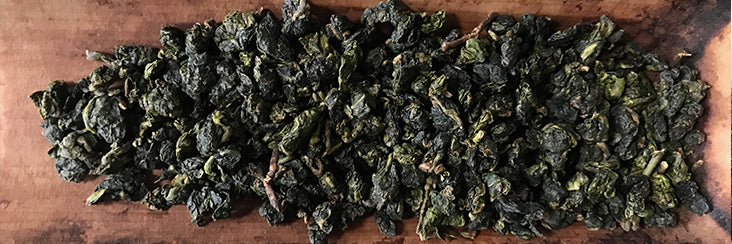
Eco-Farmed Dong Pian Jade Oolong Tea Tasting Notes | Eco-Cha Tea Club

Our friend who is an organic tea farmer kept this batch separate from his normal practice of combining winter and spring harvests for his high grade produce for retail sale. We discovered that he still had a small amount of this harvest left when we visited his farmhouse a few months ago and inquired if he had any unique batches of tea to share. In classic local manner, he modestly replied that he had a batch of Dong Pian Tsui Yu that was harvested last January. Dong Pian in Chinese basically means late winter harvest, and Tsui Yu is a hybrid strain that is translated as Jade Oolong. We tasted it and were captivated by its character, and were delighted to be told that there was enough tea be shared with the Eco-Cha Tea Club!

The late winter growing season causes slow growth rate and results in a distinct composition in the tea leaves. Typically, Dong Pian harvests are processed as a very lightly oxidized tea, due to the fact the the leaves are a bit "tougher" and are not as prone to oxidation. But this batch is sufficiently oxidized, giving it a broader spectrum of flavor and depth of character. The brewed leaves exude a heady herbal bouquet, with a balanced vegetal/mineral character on the palate. The tea has a smooth, full-flavored mouth feel, and offers a bold savory/minty finish.

The name Jade Oolong comes from its registered name in Taiwan as Tsui Yu, or Tai Cha #13. It's a hybrid strain that was developed by the Taiwan Research and Extension Station at the same time as Jin Xuan/Tai Cha #12, aka Milk Oolong. Jade Oolong was determined to be worth registering and marketing as a viable tea strain due to its distinct floral character in its flavor profile. It also offers a 20% higher yield than Qing Xin Oolong, the classic "original oolong" cultivar that is still most prevalent in Taiwan for Oolong Tea production.
Jade Oolong is now becoming increasingly rare however, as a result of the popularized Four Seasons Spring strain that offers a much higher yield than Jade Oolong, and also has a very prominent floral character when made as a "Green Oolong", i.e. a lightly oxidized, unroasted tea. It is generally acknowledged that Jade Oolong makes a distinctly better quality tea than Four Seasons Spring, especially when processed as a Dong Ding Oolong, i.e. more oxidized, and roasted. But it is a less hardy strain than Four Seasons Spring, produces less yield, and has a shorter life span. We feel that the distinctive flavor of Jade Oolong makes for a better quality tea than both Jin Xuan (Milk Oolong) and Four Seasons Spring. This is another reason why we were excited to find this batch of Eco-Farmed Dong Pian Jade Oolong Tea to share with the Eco-Cha Tea Club.

We look forward to hearing about your experiences of this month's batch of tea being shared with the Eco-Cha Tea Club. Please post your comments, photos and tasting videos here in the comments below for all of us to appreciate. Thanks for being with us, and we'll see you next month!


